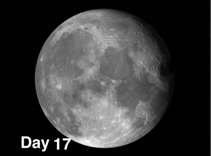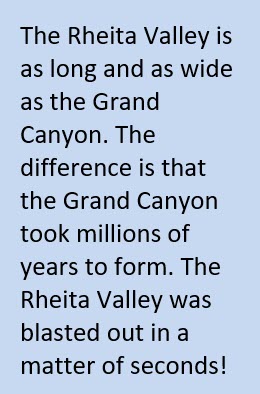The week of February 6-12 takes us from Lunar Day 16 to Day 21. This week we will highlight Vallis Rheita, located in the SE quadrant of the Field Map and viewable on Tuesday night.

 Vallis Rheita: [SE/N14; L=52°E] At 276 miles, the Rheita Valley is the longest distinct valley on the Moon. If you look closely at this formation, you will see that it is not a valley in the traditional sense but is made up of a series of interlocking craters whose alignment significantly points back to Mare Nectaris, their place of origin. When the Nectaris basin was blasted out 3.9 billion years ago, more than a dozen mountain-sized chunks of debris took flight in a curiously straight line, and when they landed they ploughed out a 240-mi. long trough which we enjoy observing today as the Rheita Valley.
Vallis Rheita: [SE/N14; L=52°E] At 276 miles, the Rheita Valley is the longest distinct valley on the Moon. If you look closely at this formation, you will see that it is not a valley in the traditional sense but is made up of a series of interlocking craters whose alignment significantly points back to Mare Nectaris, their place of origin. When the Nectaris basin was blasted out 3.9 billion years ago, more than a dozen mountain-sized chunks of debris took flight in a curiously straight line, and when they landed they ploughed out a 240-mi. long trough which we enjoy observing today as the Rheita Valley.
At the northeast end of Rheita Valley, you will find the 45-mi. crater for which it was named. It is not difficult to figure out which came first, the crater or the valley. See what you think.
 Although the Moon usually appears absolutely flat, this sector of the Moon gives you a noticeable three-dimensional effect as Rheita Valley diminishes into the distance around the curve of the Moon.1
Although the Moon usually appears absolutely flat, this sector of the Moon gives you a noticeable three-dimensional effect as Rheita Valley diminishes into the distance around the curve of the Moon.1
1 During a lunar eclipse you will frequently notice a striking three-dimensional effect as light being refracted through the atmosphere on opposites sides of the Earth strike the lunar surface from different angles.
======================
It is highly recommended that you get a copy of Sky and Telescope’s Field Map of the Moon, the very finest Moon map available for use at the telescope. It is available for $10.95 at www.skyandtelescope.com and on Amazon. All features mentioned in this blog will be keyed to the grid on the Field Map and will look like this: Plato: [NW/D9]
Credits:
Courtesy of Gray Photography of Corpus Christi, Texas
Lunar photos: NASA / USGS / BMDO / LROC / ASU / DLR / LOLA / Moon Globe. Used by permission
- Hippalus Rilles on the Moon - April 15, 2024
- Moon Crater Janssen: How New Moon Craters are Superimposed on Top of Older Craters - April 8, 2024
- Crater Longomontanus on the Moon - April 1, 2024